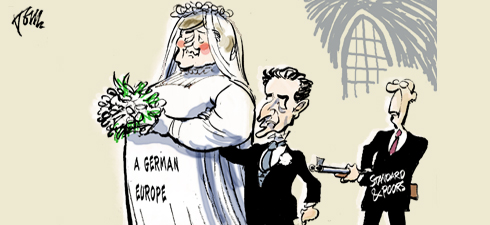Executive, legislative, judicial: political philosophy teaches that a democratic state is based on the separation of these three branches of government, but is also grounded in the dynamic of opposition by which each branch checks and balances the others and wields no power exclusive to itself alone.
The economic crisis has swept away that old structure. In the three years it has been with us, with its outstanding episodes, its ironic succession of breakthroughs followed by disillusionment, the crisis reminds us how obsolete the structure has become.
So only a few hours after a satisfied Nicolas Sarkozy and Angela Merkel announce their European projects with great pomp, a rating agency ridicules and brushes them aside and places the euro zone on negative watch.
Cover up the political disarray
The founding basis of democracy is now being succeeded by a new and brutal organisation of forces. A new economic power with no opposition capable of either restraining or even regulating it lords it over all the others and dictates its own law. Never before has the balance of strengths and weaknesses been so apparent as it is now; never before has political power seemed so helpless.
The main issue of the presidential campaign will be to cover up the political disarray and the impossibility of taking any effective political action. The past three years have shown that the firefighters have been running after the fires, always arriving too late.
Commentators will focus on the beauty of the diplomatic moves and the skill of diplomatic compromise. Meanwhile, everything will depend, today and tomorrow, on how the social consequences of the crisis are managed.
Translated from the French by Anton Baer
Counter-attack
EU surveys the agencies
“S & P, new boss of the euro zone”, headlines La Tribune. However, the French business daily goes on to report that the European Securities and Markets Authority (ESMA) has launched an investigation into the rating agencies.
The Authority, charged with overseeing credit rating agencies at the European level, has sent inspectors to offices of Standard & Poor’s, Moody’s and Fitch, as well as smaller competitors. Launched in early November, the inspection should continue throughout December and come out with a report on the working methods of the agencies, to be published next April.
If infractions are discovered, an ESMA spokesman said, the Authority would have the power to fine the offending agencies and to suspend their rating – or even take away their license. “They must prove that their rating procedure is sound, for example free of conflicts of interest, and that they have appropriate internal regulations,” he clarified.
Do you like our work?
Help multilingual European journalism to thrive, without ads or paywalls. Your one-off or regular support will keep our newsroom independent. Thank you!
















